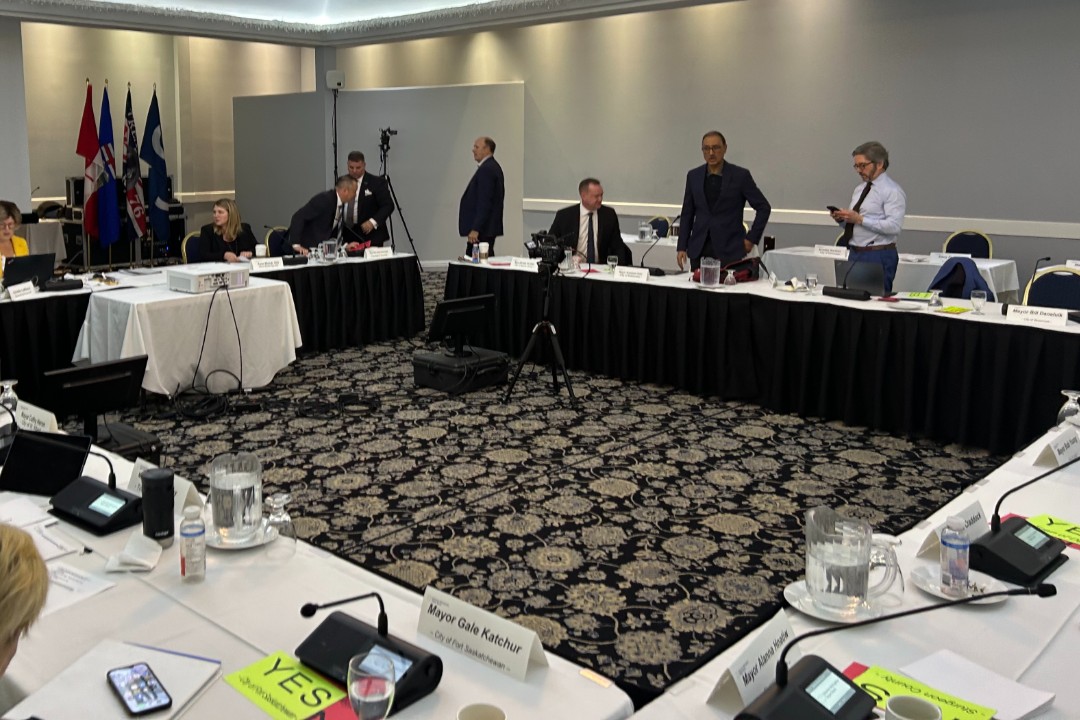The Edmonton Metropolitan Region Board will wrap operations as of March 31 following a unanimous vote to dissolve the organization at a meeting at the Chateau Louis Hotel & Conference Centre in Edmonton on Jan. 23.
"It was a little bittersweet around the table today," Jeff Acker, the mayor of Spruce Grove and the vice-chair of the board, told Taproot at the meeting. "Talking to our colleagues around the table, there was a huge amount of optimism of, 'What is the next iteration of regional collaboration?'"
In November, the United Conservative Party government announced it would cut its funding to regional growth management boards in Edmonton and Calgary, and also switch their membership from mandatory to voluntary. By 2024, the EMRB was receiving $1 million annually from the province. At the time, Edmonton Coun. Andrew Knack predicted the UCP decision would be the end of the EMRB.
Looking back over regional planning history that stretches back to the 1940s, the EMRB replaced the Capital Region Board in 2017. That board was established as a mandatory growth management board in 2008, and the 2017 change cut its purview from 24 municipalities to 13 — Edmonton, St. Albert, Strathcona County, Sturgeon County, Parkland County, Leduc County, the City of Leduc, Spruce Grove, Fort Saskatchewan, Beaumont, Devon, Morinville, and Stony Plain. The EMRB's role was to ensure responsible growth for the region with binding planning documents like the Regional Growth Plan.
Allan Gamble, the mayor of Parkland County and chair of the EMRB, told Taproot the decision to dissolve the board will lead to new forms of planning. "As a mature board, this provides an opportunity for us to move in a different direction that looks at being more of an advisory-type board than a regulatory board," Gamble said. "It opens a door for us to have willing partners who want to work alongside us to ultimately provide the best services that we can for our residents."
Both Gamble and Acker said the main reason to end the board is that voluntary participation and the board's framework don't mix. For example, regulatory procedures that the board uses, like regional evaluation frameworks and area structure plans, don't match with how members want to collaborate if that membership is optional.
Acker made clear he did not think the funding the province cut from the board was "top of mind" in the unanimous decision to end its operations. Aside from the province's contribution, member municipalities covered the remaining $1.9 million to run the board each year.
"It wasn't about the dollars," Acker said. "It was about, fundamentally, asking us to voluntarily bring our communities together under strict regulation."
Both Acker and Gamble said it's too soon to say what regional collaboration will look like in the future, but that more details may become available at the final EMRB board meetings on Feb. 21 and March 20. The EMRB streams its meetings online and later posts recordings.

The 13 member municipalities of the Edmonton Metropolitan Region Board voted to end its operations on Jan. 23. (Colin Gallant)
Edmonton Mayor Amarjeet Sohi tabled a motion to explore the future of regional cooperation at a special city council meeting on Jan. 20. The motion, passed unanimously, instructs administration to collaborate with other regional municipalities "to initiate a new voluntary regional governance table" and bring back a draft memorandum of understanding with interested parties at a future meeting.
Shortly after the Jan. 23 vote, Sohi told Taproot in an email that he hopes regional thinking continues.
"I am optimistic that my colleagues in the 13 Edmonton region municipalities are committed to continuing our strong regional partnerships," Sohi said. "We will be meeting in the coming weeks to discuss opportunities for continued collaboration on economic development, growth, and how we can work together to support the needs of our residents."
Gamble and Acker, meanwhile, said elements of the EMRB's work are already embedded in planning documents for their respective municipalities.
The decision to end the EMRB was broken into three motions that were each unanimously approved: That the board wind down as of March 31; that a letter be sent to Municipal Affairs Minister Ric McIver to signal the decision; and that the board appoint a trustee to deal with any remaining assets as of April 1.
Karen Wichuk, the chief executive officer of the EMRB, told Taproot that the details of assets and the trustee are still to be determined.
